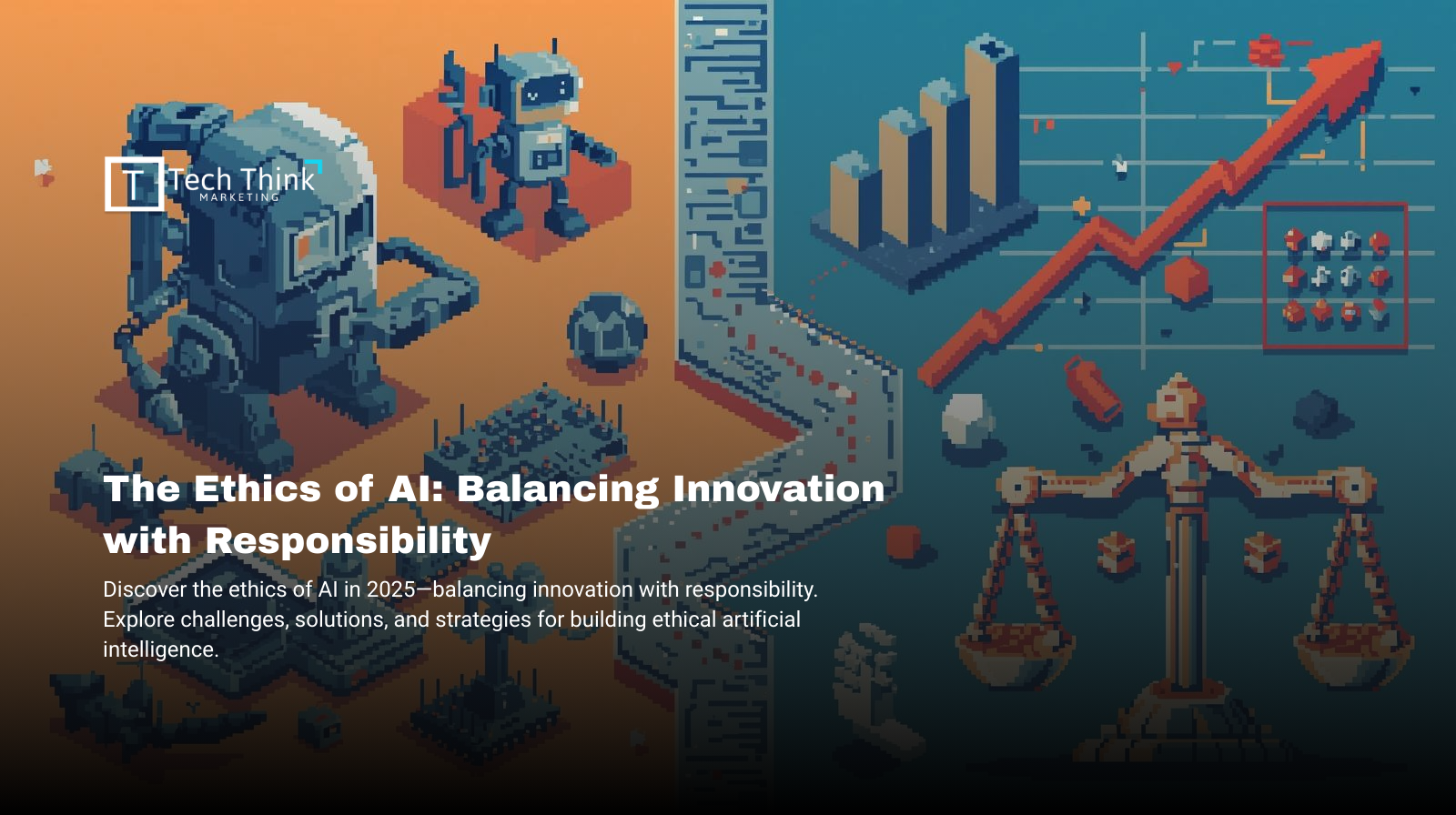Office No. 608, Lunkad Sky Station, Viman Nagar Road, Pune, Maharashtra 411014, India
Phone: +1 213-261-0597
contact@techthinkmarketing.com
Ethics of AI intelligence (AI) has developed rapidly into an integral part of our everyday life with a future concept. From voting assistant to advanced medical diagnostic systems, AI, such as Alexa and Siri, has transformed industries and human interactions. Although innovation improves development, moral concerns about AI cannot be ignored. Companies, authorities and societies should address big questions: How do we ensure that AI is used responsibly? How do we balance innovation with accountability?
In this blog, we will explore the best practice of AI’s moral implications, challenges in regulation, potential risks and responsible AI systems.Artificial intelligence (AI) has developed rapidly into an integral part of our everyday life with a future concept. From voting assistant to advanced medical diagnostic system, AI, such as Alexa and Siri, are transformed industries and human interactions. Although innovation improves development, moral concerns about AI cannot be ignored. Companies, authorities and societies should address big questions: How do we ensure that AI is used responsibly? How do we balance innovation with accountability?
In this blog, we will explore the best practice of AI’s moral implications, challenges in regulation, potential risks and responsible AI systems.
Table of Contents
ToggleUnderstanding the Promise of AI
AI is very likely to change industries:
Ethics of AI services: AI algorithm helps detect diseases first, advise on treatment and adapt the patient’s care.
- Finance: Automatic trade, detection of fraud and assessment of credit risk becomes more effective with AI.
- Marketing: Companies use AI for targeted advertising, customer insight and automated campaigns.
- Education: Learning for Adaptive Leariannals Praffitures students run by AI.
The promise of AI is clear: quick decision, greater efficiency and better problem solving. But responsibility comes with force.
Why AI Ethics Matter
Ethics of AI AI, moral is about justice, responsibility, openness and security. It is important to ask as AI becomes more powerful:
- Prejudice and Discrimination – If AI is trained on partial data sets, it can strengthen stereotypes, which can lead to inappropriate consequences in work, loan or law enforcement.
- Privacy Interest – AI systems process a huge amount of personal data. Without security measures, the user is at risk.
- Responsibility – If AI makes a harmful decision – who is responsible for the developer, company or algorithm?
- Job shift – automation can change millions of jobs, questions about financial justice and workforce.
- Autonomous weapons – the use of AI in military applications improves global debate on morality and human security.
These concerns shed light on why AI innovation cannot be without moral disposition.
Key Ethical Challenges in AI Development
1. Bias in Algorithms
AI Ethics of AI systems learn from data. If the data contains human biases, the algorithm may replicate and even amplify them. For example, facial recognition tools have shown higher error rates for women and people of color. Ensuring diverse and inclusive datasets is critical to avoiding discrimination.
2. Transparency and Explainability
AI models, especially deep learning systems, often operate as “black boxes.” Businesses and users may not fully understand how decisions are made. Lack of transparency can erode trust. Explainable AI (XAI) is an emerging field that aims to make AI decisions more understandable and interpretable.
3. Data Privacy
AI thrives on data—but data misuse poses risks. Companies must comply with privacy regulations like GDPR (General Data Protection Regulation) and ensure user consent before collecting and analyzing data.
4. Autonomy and Human Control
Ethics of AI AI-powered tools can act autonomously, but critical decisions—such as medical treatment or law enforcement—should involve human oversight. Striking the right balance between automation and human control is essential.
5. Economic Inequality
Ethics of AI adoption of AI may disproportionately benefit large corporations while leaving smaller businesses and underdeveloped regions behind. Policymakers must address how AI-driven economic growth is distributed fairly.
Balancing Innovation and Responsibility
Ethics of AI challenge lies in promoting innovation while ensuring AI remains safe and ethical. Here’s how this balance can be achieved:
1. Ethical AI Frameworks
Ethics of AI should adopt guidelines for ethical AI development, focusing on fairness, accountability, transparency, and inclusivity. Big tech companies like Google and Microsoft have already introduced AI ethics charters to guide their innovations.
2. Regulatory Oversight
Ethics of AI need to establish clear regulations around AI use. The European Union’s AI Act is an example, setting rules for high-risk AI systems. However, regulations must not stifle innovation but instead encourage responsible practices.
3. Human-in-the-Loop Systems
Ethics of AI AI should assist humans, not replace them entirely. For sensitive areas like healthcare, finance, and law enforcement, human decision-makers must oversee AI outputs.
4. Bias Auditing and Testing
Ethics of AI audits can help identify and correct bias in AI systems. Independent third-party testing ensures that algorithms are fair, accurate, and safe.
5. Public Awareness and Education
Building awareness among users and citizens about how AI works, its risks, and its benefits helps create an informed society that can demand accountability.
Real-World Examples of Ethical AI in Action
- Healthcare AI: IBM Watson has faced criticism for biased recommendations. This pushed healthcare providers to demand more explainable AI systems.
- Hiring Algorithms: Amazon once scrapped its AI recruitment tool after discovering it discriminated against women. Today, companies invest in bias-free recruitment AI.
- Social Media: Platforms like Facebook and X (formerly Twitter) use AI to filter harmful content. However, debates continue about censorship and freedom of speech.
- Autonomous Vehicles: Tesla and other companies face ethical dilemmas around safety and liability in self-driving cars. Who is responsible in case of an accident?
These examples show that responsible AI practices can evolve only through trial, error, and accountability.
The Future of AI Ethics
As AI continues to evolve, ethical considerations will shape its adoption:
- Global Collaboration: Ethical AI cannot be a single-country effort. Global cooperation is essential for setting universal standards.
- AI for Good: AI should be directed toward solving humanity’s biggest challenges, like climate change, poverty, and healthcare inequality.
- Stronger AI Governance: Boards, policymakers, and developers will increasingly prioritize AI governance frameworks to monitor usage.
- Ethical AI as a Competitive Advantage: Companies that prioritize ethics will earn greater trust, brand reputation, and customer loyalty.
Conclusion
Artificial Intelligence is one of the most powerful innovations of our time, but power without responsibility can lead to harm. To truly benefit from AI, businesses and governments must balance innovation with ethics. This means addressing bias, ensuring transparency, protecting privacy, and keeping humans at the center of decision-making.
The future of AI depends not only on technological advancements but also on our ability to use it responsibly. By embedding ethics into every stage of AI development, we can unlock its full potential while safeguarding human values.





